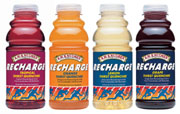Those differences aside, the categories share several traits: notably the same target demographic and an increased focus by major beverage manufacturers. In addition, Mintel International Group, Chicago, believes each would be well-served by expanding their horizons to include more women and to retain consumers as they age.
A Fountain of Youthful Consumers
Mintel finds that young consumers, particularly, are attracted to the sports drink category—notably those under the age of 34 and, especially, teenagers. Even 12-year-olds and younger have been found to identify closely with sports drinks.Already the category leader by far, Gatorade, a division of PepsiCo, Purchase, N.Y., is moving to reach the younger base with its introduction of All*Stars small-sized multi-packs in berry, watermelon and strawberry flavors. Packaged as six-packs of 12-oz. small-mouth bottles, the product is designed to be gripped easily and handled by children.
The All*Stars product may be in bottle form, but Mintel finds another opportunity to reach that youthful demographic using an underutilized packaging form. Representing a small portion of the sports drink category, aseptic cartons have a strong association with children and fun, so those two factors could lead to a successful kid-oriented sports drink. However, Mintel suggests there may be “a dissonance with the positioning of serious athletes” that prevents sports drinks manufacturers from adopting the aseptic carton that works so well in other categories.

Mintel's exclusive consumer survey finds the refreshment factor has led to a change in the attitudes of the core consumer base. While two-thirds of those surveyed enjoy sports drinks in connection with sports activity, almost as many regard the products as “anytime” drinks. This suggests sports beverages have crossed from the benefit-oriented category into the refreshment arena, where carbonated beverages can be found.
Despite that increased perception, sports drinks continue to be a largely youth-oriented product. The report finds a “dramatic correlation” between youth and consumption, implying brands fail to hold their consumers as they age. The category, therefore, continues to grow by attracting large numbers of new, younger consumers to replace those leaving the category. Retaining those consumers, or establishing “flanking” brands to provide a natural progression as consumers age, may become essential for the category's growth.

Similar to other categories, sports beverages are targeting the fast-growing Hispanic populace. Gatorade began the trend with Xtremo, a line of more exotic and tropical flavors (in mango, tropical, and citrico varieties), supported by bilingual packaging and Spanish-language advertising. The product may find some competition from Pepsi's old nemesis, Atlanta-based Coca-Cola, whose Powerade brand also is using Spanish-language advertising to expand its market base.
Like the soda market, Coca-Cola and Pepsi firmly are entrenched in the sports drink field, though Gatorade gives Pepsi the dominant product in this category. Powerade recently underwent a dramatic reformulation of seven main flavors, increasing their fortification with B-vitamins.
A similar transformation also has put Atlanta-based Monarch Company firmly on the sports beverage map. All Sport Body Quencher, a Monarch buy from Pepsi, was re-launched this past spring. Monarch aims to increase All Sport's share to 10% of the category and has reformulated to non-carbonated versions of its flavors, as well as fortified the products with vitamins B and C. All Sport's share in 2001 was 7.0%.
Who Has the Energy?
Similar involvement by major companies has firmly cemented energy drinks as a category to watch. The acquisition of South Beach Beverage (SoBe) brought Adrenaline Rush into the Pepsi ranks, while Coca-Cola entered the energy drinks market with KMX Energy Drink through its Delaware Punch Co. subsidiary. Though a non-participant in sports drinks, Anheuser-Busch, St. Louis, has ventured into non-alcoholic territory with 180 energy drink. Containing guarana, B-vitamins, vitamin C and malt extract, 180 partially targets on-premises consumption as a mixer with vodka and other spirits, Mintel reports.Similarly, category founder and leader Red Bull GmbH (North American offices in Pacific Palisades, Calif.) can attribute much of its growth to club usage, as both an enhancer and as a mixer for spirits—particularly vodka. The company has taken advantage of this in its marketing efforts, which include a Red Bull drinks menu listing such popular concoctions as Red Bull with flavored vodka, tequila or Jagermeister.
Red Bull launched its one and only product in Europe in the early 1990s and ventured Stateside in 1997. Despite its status, Red Bull is not without its own regulatory issues. The Norwegian government classified the product as a medicine and banned sales in retail outlets. Sweden's public health agency has issued a warning after media accounts associated Red Bull consumption with the deaths of three young people. Furthermore, an Australian watchdog group is urging authorities there to probe the company's claims.
According to the Mintel report on energy supplements (of which energy drinks are a small portion), Red Bull has been “explicit about the benefits of its products,” claiming to improve performance, especially under increased stress or strain; increase endurance; improve concentration and increase reaction speed. Those claims have been (and are being) investigated around the world, and many experts believe it is only a matter of time before U.S. regulatory authorities weigh in on the matter.
Increased regulation may lead to changes in the energy drink category. Major mainstream companies are attracted to the category and just may be awaiting a stable regulatory environment and aggressive enforcement, says Mintel. With more players in the field, relatively expensive energy drinks could well see their price points fall; considering the softening economy, this may be in the offing regardless.
Lower prices could attract an audience beyond what has been the initial target market—Generation X/Echo Boomers (those aged 8-37). While this age group accounts for a significant portion of the population, Mintel believes manufacturers will need to “turn to the older and faster-growing groups.” Older consumers (those 55 and over) are increasing their activities and joining health clubs, and are a strong potential market for energy supplements, in general. (In 2002, Gen-Xers are aged 26-37, and make up 16% of the population. Echo Boomers are aged 8-25, and make up 26% of the population.)
Mintel believes that, because of their high levels of activity, relative to previous generations, seniors are candidates for the types of energy drinks like Ross Products', Columbus, Ohio, Ensure Energy Drinks with Lutein; Met-Rx, Irvine, Calif., Protein Shake; and Mead Johnson Nutritional's, Evansville, Ind., Boost Breeze Nutritional Energy Juice Drink.
Currently, three groups of consumers are the primary targets for energy drinks, says Mintel: “club-goers interested in energy for non-stop partying; students who want enhanced performance; and athletes, especially those involved in extreme sports.”
As such, energy drinks are primarily occasional purchases and can best be considered an impulse buy for a quick energy boost. Thus, the typical package for the category is a slimline, single-serve can, making convenience stores the most important venue. This is expected to remain the case until distribution broadens, at which time category leaders may convert casual users to regular consumers by providing multi-can packages to food and mass-merchandiser channels.
Mintel International Group has several reports that focus upon the sports/energy drinks market in the U.S., including “Sports Drinks,” “Functional Beverages” and “Energy Supplements.” For more information on any of these, contact Mintel International Group Ltd.; 213 W. Institute Place, Suite 208; Chicago, IL 60610; phone: 312-932-0400.
The closing paragraph of June's category analysis should have read: For more information on the report, “The U.S. Table Sauces Market,” contact Mintel International Group Ltd.; 213 W. Institute Place, Suite 208; Chicago, IL 60610; phone: 312-932-0400. We apologize for any confusion this may have caused.
